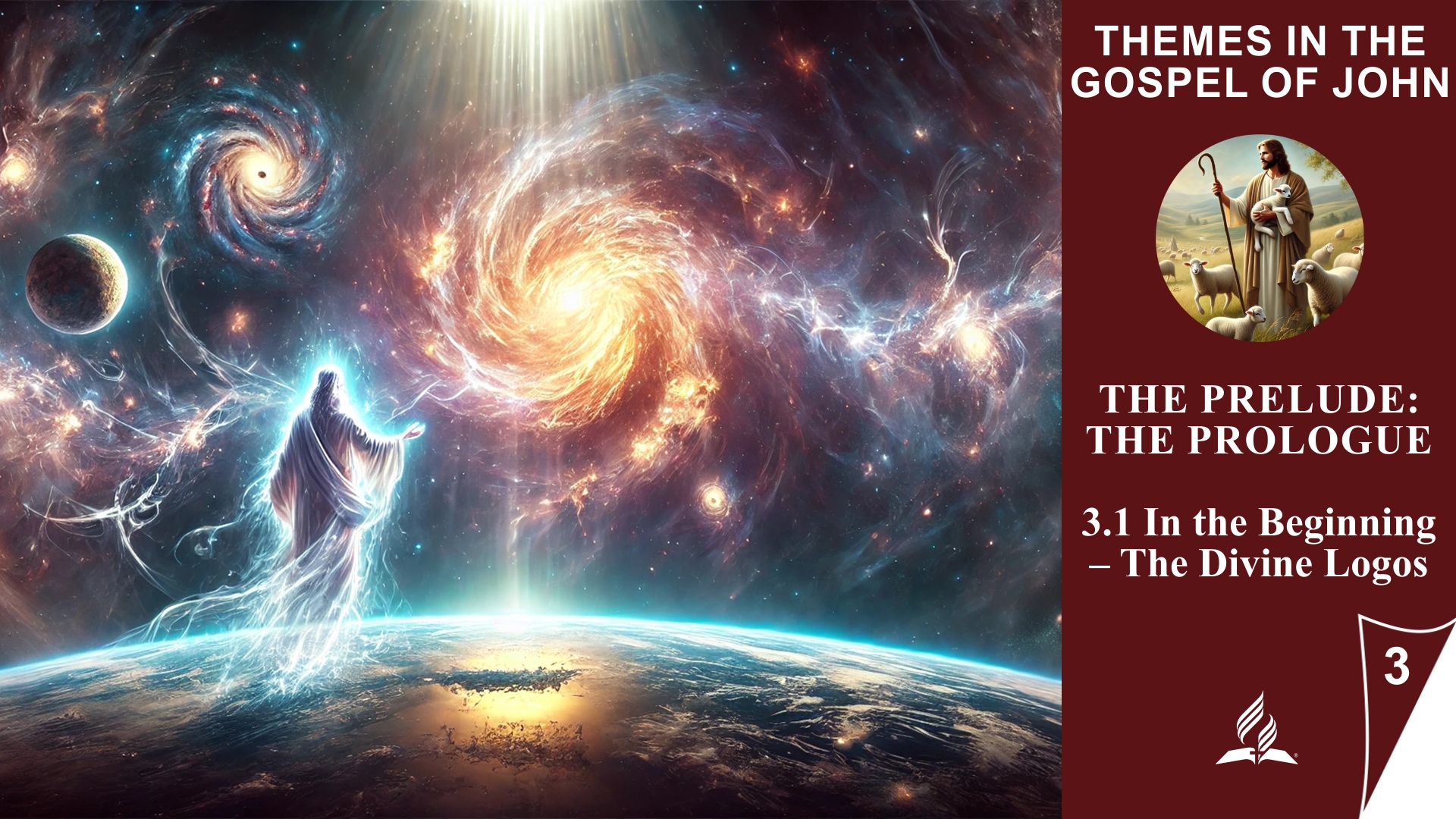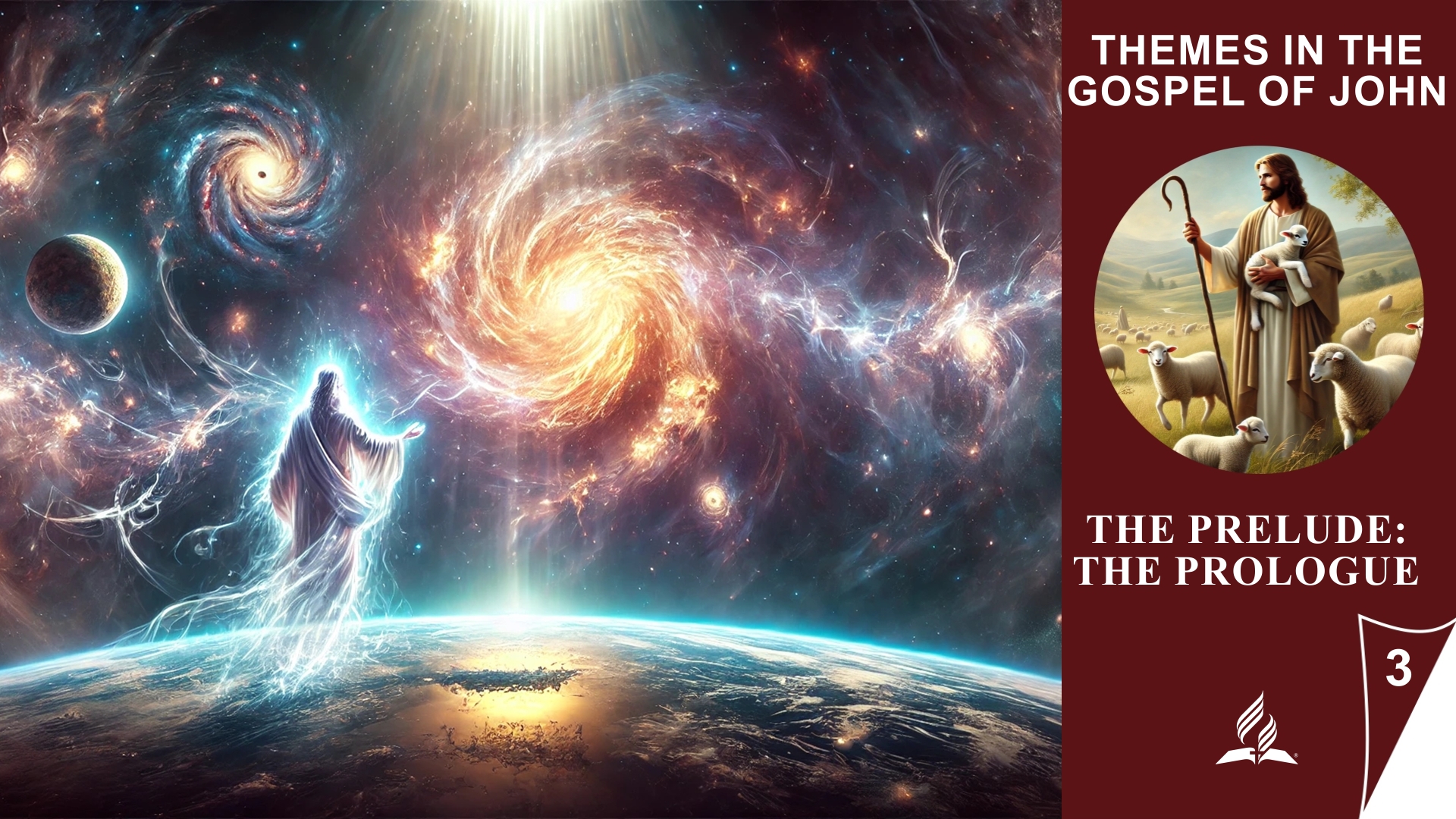


Lesson 3.The Prelude: The Prologue
The Divine Revelation: The Prologue in the Gospel of John
The introduction to Lesson 3 leads us into the first verses of the Gospel of John, which reveal deep and fundamental truths about Jesus Christ. John does not begin his Gospel with the birth or the works of Jesus but with a majestic portrayal of His eternal existence and divine nature. In the opening verses, he shows that Jesus, the Word (Logos), was not only involved in the beginning of creation but is Himself God and the source of all life and light.
The prologue serves as a summary of the great themes of the Gospel: the incarnation of God in Jesus Christ, the struggle between light and darkness, as well as faith and unbelief. These powerful themes form the foundation for the entire Gospel of John and challenge us to think more deeply about the identity of Jesus. In this lesson, we explore how the eternal glory of Christ is revealed in His incarnation and redemptive work, and how these truths shape our faith and daily lives.
3.1 In the Beginning – The Divine Logos
The Eternal Nature and Creative Power of the Divine Logos
Read John 1:1–5. What do these words reveal about the Word, Jesus Christ?
The prologue of the Gospel of John, particularly John 1:1–5, reveals deep theological truths about Jesus Christ, the “Word” (Greek: Logos). In these verses, the eternity and divinity of Jesus are emphasized. John begins with the statement, “In the beginning was the Word,” indicating that Jesus already existed before creation. This draws a clear parallel to the creation account in Genesis 1:1 and affirms the eternal nature of Jesus.
Furthermore, John describes that “the Word was with God,” emphasizing the deep, intimate fellowship between the Son and the Father. It paints a picture of unity and closeness within the Godhead that surpasses human understanding. At the same time, the phrasing “and the Word was God” makes it clear that Jesus was not only with God but is Himself divine. The difference in the use of the definite and indefinite articles in Greek underscores that while Jesus is God, He is not identical with the Father but is the second person of the Trinity.
By stating that “all things were made through Him,” the creative power of Jesus is also highlighted. He is not merely a witness to creation but the active Creator, the origin and foundation of all being. This underscores His divine authority and central role in God’s plan.
John emphasizes in these verses the divine nature, eternity, and creative power of Jesus, thus opening the Gospel with a profound insight into the identity of Christ as the eternal Word, who is not only with God but is God Himself and through whom all things were created.
Why is the full divinity of Christ a very important part of our theology? What would we lose if Jesus were in any way only a created being? Prepare to discuss this on the Sabbath and discuss why the eternal divinity of Christ is very important for our faith.
The full divinity of Christ is a central and indispensable part of Christian theology. If we were to downplay the divinity of Jesus or consider Him merely a created being, it would have profound implications for the entire Christian faith and the doctrine of salvation.
Here are some reasons why the eternal divinity of Christ is so crucial and what is at stake if we abandon this doctrine:
-
The Credibility of Jesus’ Sacrifice Only a divine being could bear the sins of all humanity and offer a sacrifice that is infinitely sufficient to redeem people of all ages. If Jesus were merely a created being, His sacrifice would not be adequate. A created being might be able to die for a limited number of people but not for all humanity. His divinity makes His sacrifice perfect and valid for all people.
-
Sinlessness and Perfection Redemption is based on the fact that Jesus was without sin (Hebrews 4:15). A created being, even if perfectly created, could fall into temptation, as Adam did. Only a divine being can remain absolutely sinless and perfect despite temptations. Jesus’ divinity guarantees His sinlessness and thus His ability to fully redeem us.
-
Authority Over Creation John 1:3 clearly states that Jesus is the creator of all things. If He were a created being, He could not be the Creator but would be part of creation. This would call His authority and power over creation into question. But as God, He has authority over life, death, and all creation. This is crucial for our worship and trust in Him as Lord and Savior.
-
The Nature of Worship Scripture teaches that only God alone should be worshiped (Matthew 4:10). If Jesus were not God, worshiping Him would be idolatry. However, in Scripture, Jesus is worshiped by people and angels alike (Philippians 2:9–11; Revelation 5:12–14), indicating that He is fully divine and worthy of worship in every respect.
-
Eternal Life and Salvation Only God can grant eternal life (John 17:3). If Jesus were not God, He would not have the power to give us eternal life. Our salvation depends on the fact that Jesus is divine and therefore capable of freeing us from sin and granting us eternal life.
-
Understanding the Trinity The divinity of Jesus is also crucial for our understanding of the Trinity. The Trinity describes one God in three persons – Father, Son, and Holy Spirit. Each person of the Trinity is eternal and divine. If Jesus were not God, the concept of the Trinity would collapse, and our understanding of God would be distorted.
-
God Himself Became Man for Us The deepest expression of God’s love and mercy lies in Him becoming man Himself to redeem us (Philippians 2:6–8). This gives us a deeper understanding of God’s love. If Jesus were only a created being, we would not have the same closeness and assurance that God Himself has given Himself to save us.
Summary:
The full divinity of Jesus is absolutely necessary for our faith. It ensures the effectiveness of His sacrifice, His sinlessness, His creative power, the legitimacy of His worship, and the certainty of our salvation. Without the divine nature of Christ, the Christian faith would lose its foundation, and we could not rely on the salvation promised to us through Jesus as being truly perfect and effective. Therefore, the eternal divinity of Christ is not just a theological detail but the core of our hope and trust.
The full divinity of Christ not only has theological significance but also a deep connection to our everyday life and faith. It influences how we experience God, how we shape our lives, and what hope we have in the daily struggles of faith. Here are some practical connections that show why the doctrine of the eternal divinity of Christ is so important for our daily lives:
-
Security in Our Salvation In everyday life, we often experience moments of guilt, failure, and doubt. The assurance that Jesus Christ is not only a created being but the eternal God gives us the certainty that His forgiveness is complete and sufficient. His sacrifice on the cross has infinite value because it was brought by God Himself. This assurance gives us inner peace, even when we feel imperfect or fail.
-
Trust in Divine Help In the challenges of everyday life—whether at work, in relationships, or in personal struggles—we can know that we are not alone. Since Jesus is God, we can pray with confidence and trust that He has the power to intervene. He understands our weaknesses and worries because He lived as a man on earth, but at the same time, as God, He has the power to perform miracles and change our circumstances (Hebrews 4:15–16).
-
Model of Perfect Love The fact that God Himself became man in Jesus Christ shows us the ultimate example of love and dedication. This love motivates us to serve others and show compassion and mercy in our daily interactions. Jesus’ willingness to come down from heaven inspires us to act selflessly, whether in our family, church, or society (Philippians 2:5–8).
-
Certainty of Eternal Life The divinity of Christ not only guarantees forgiveness but also the gift of eternal life. If Jesus were only a created being, we could not be sure that He can lead us to eternal life. But because He is God, we can live each day with the firm hope that our lives extend beyond this earthly existence and that we will be with Him in eternity. This hope gives us strength to persevere even in difficult times and to align our perspective with the eternal (John 17:3).
-
Importance of Worship in Daily Life Understanding that Jesus is God changes how we worship Him in daily life. Worship is not confined to Sabbath services but becomes a lifestyle. We recognize that every action, every prayer, and every moment of devotion is an opportunity to honor the Creator God. This can help us make our daily decisions more consciously in light of His greatness and love (Colossians 3:17).
-
The Power of the Word in Our Lives Since Jesus is the divine Word (Logos), His word still has creative power in our lives today. By reading the Bible daily and allowing His words to work upon us, we experience transformation. The Word of God creates new life within us, renews our spirit, and gives us guidance in life’s challenges (John 1:1–5).
Conclusion:
The divinity of Jesus is not just an abstract theological doctrine but has direct implications for our daily lives. It gives us security, hope, trust, and a deeper understanding of God’s love. By acknowledging the truth of Jesus as the eternal, divine Word, we can live each day in the power of His presence, share His love, and stand in the certainty of eternal life.

Jesus Christ, the eternal Word, is our source of light, life, and hope—yesterday, today, and forever.
Visited 40 times, 1 visit(s) today







